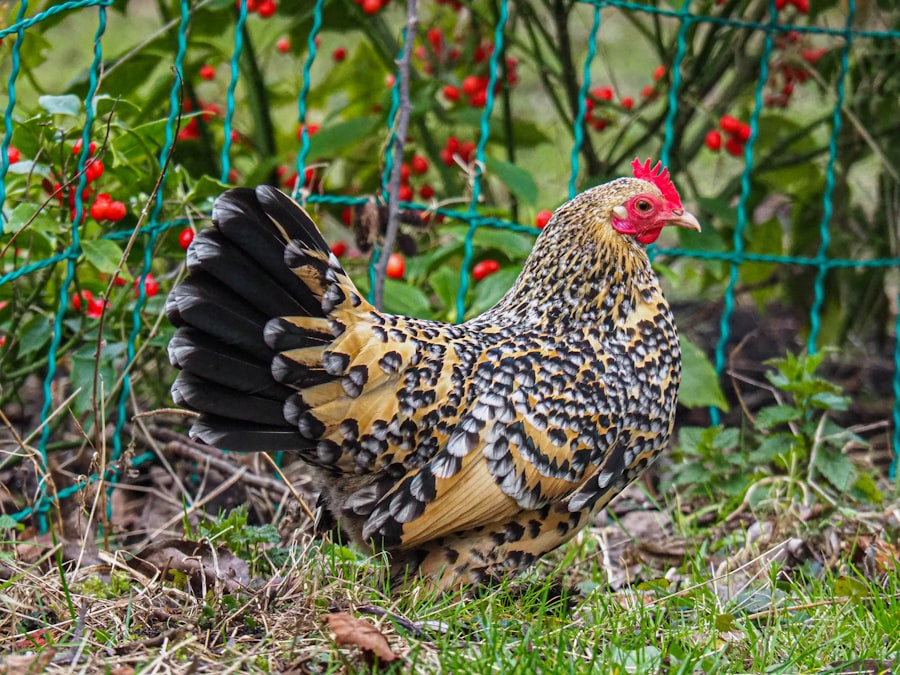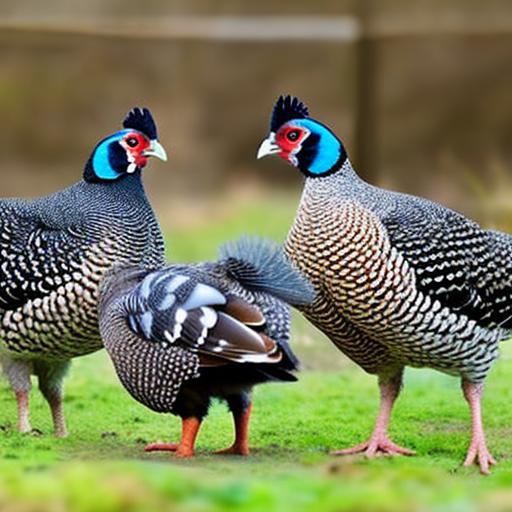Keeping guinea fowl and chickens together can be a rewarding experience for poultry enthusiasts. Both species offer unique benefits and characteristics that can complement each other in a mixed flock. Guinea fowl are known for their excellent pest control abilities, as they are voracious insect eaters, while chickens are valued for their egg production and friendly demeanor. By keeping these two species together, poultry keepers can enjoy the best of both worlds. However, it is important to understand the differences between guinea fowl and chickens, as well as their specific needs, in order to create a suitable living environment and ensure their well-being.
Key Takeaways
- Guinea fowl and chickens can be kept together, but it requires careful planning and consideration of their unique needs and behaviors.
- Guinea fowl are more independent and prefer to roost in trees, while chickens are more social and prefer to roost in a coop.
- Providing separate areas for roosting and nesting, as well as plenty of space to roam, will help create a harmonious living environment for both species.
- Guinea fowl and chickens have different dietary requirements, so it’s important to provide a balanced diet that meets the needs of both species.
- Monitoring the social dynamics and providing plenty of space and resources can help minimize aggression and ensure a peaceful coexistence between guinea fowl and chickens.
Understanding the Differences Between Guinea Fowl and Chickens
Guinea fowl and chickens may seem similar at first glance, but they have distinct differences in terms of behavior, diet, and habitat preferences. Guinea fowl are known for their wild and independent nature, often preferring to roost in trees rather than in a coop like chickens. They are also more prone to flight and can be skittish around humans compared to chickens, which are generally more docile and easily handled. In terms of diet, guinea fowl are excellent foragers and prefer a diet rich in insects and greens, while chickens are omnivores that require a balanced diet of grains, seeds, and protein. Understanding these differences is crucial when creating a suitable living environment for both species.
Creating a Suitable Living Environment for Guinea Fowl and Chickens
When keeping guinea fowl and chickens together, it is important to provide a living environment that meets the needs of both species. This includes providing adequate shelter, roosting space, and nesting areas that accommodate the different behaviors of guinea fowl and chickens. For example, while chickens may be content to roost in a traditional coop, guinea fowl may prefer higher perches or even trees for roosting. Additionally, providing ample space for foraging and dust bathing is essential for both species’ well-being. It is also important to consider predator-proofing the living environment, as both guinea fowl and chickens are susceptible to predation. By understanding the specific habitat preferences of guinea fowl and chickens, poultry keepers can create a harmonious living environment that meets the needs of both species.
Feeding and Nutrition for Guinea Fowl and Chickens
Feeding and nutrition are crucial aspects of keeping guinea fowl and chickens together. While both species can benefit from a diet of commercial poultry feed, it is important to consider their specific dietary requirements. Guinea fowl are avid foragers and require a diet rich in insects, seeds, and greens to thrive. They also have a higher protein requirement compared to chickens, making it important to supplement their diet with mealworms or other high-protein treats. On the other hand, chickens require a balanced diet of grains, seeds, and protein to support egg production and overall health. Providing separate feeding areas for guinea fowl and chickens can help ensure that each species receives the appropriate nutrition without competition. Additionally, offering access to grit and oyster shell for chickens, as well as providing ample opportunities for foraging, can help meet the dietary needs of both species.
Managing the Social Dynamics Between Guinea Fowl and Chickens
Managing the social dynamics between guinea fowl and chickens is an important consideration when keeping them together. While both species can coexist peacefully, it is important to introduce them gradually to minimize stress and aggression. Guinea fowl are known for their assertive nature and may initially assert dominance over chickens, especially during feeding time. Providing multiple feeding areas can help reduce competition and minimize conflicts between the two species. Additionally, observing their interactions and providing ample space for both guinea fowl and chickens to establish their own territories can help prevent aggression and ensure a harmonious flock dynamic. By understanding the social behaviors of guinea fowl and chickens, poultry keepers can effectively manage their interactions and promote a peaceful coexistence within the mixed flock.
Health and Disease Considerations for Keeping Guinea Fowl and Chickens Together

When keeping guinea fowl and chickens together, it is important to be mindful of their health and disease considerations. Both species are susceptible to common poultry diseases such as coccidiosis, respiratory infections, and external parasites. Monitoring the flock for signs of illness, providing regular health checks, and practicing good biosecurity measures can help prevent the spread of disease within the mixed flock. Additionally, ensuring that the living environment is clean, dry, and well-ventilated can help promote overall health and well-being for both guinea fowl and chickens. It is also important to provide separate dust bathing areas for guinea fowl and chickens to minimize the risk of parasite transmission. By being proactive about health management and disease prevention, poultry keepers can help ensure the long-term well-being of their mixed flock.
Conclusion and Tips for Successfully Keeping Guinea Fowl and Chickens Together
In conclusion, keeping guinea fowl and chickens together can be a rewarding experience that offers the benefits of pest control, egg production, and unique behaviors within a mixed flock. By understanding the differences between guinea fowl and chickens, creating a suitable living environment, providing appropriate feeding and nutrition, managing social dynamics, and being mindful of health considerations, poultry keepers can successfully keep these two species together. Some tips for successfully keeping guinea fowl and chickens together include providing ample space for both species to establish their own territories, offering separate feeding areas to minimize competition, and observing their interactions to ensure a harmonious flock dynamic. With proper care and attention to their specific needs, guinea fowl and chickens can thrive together in a mixed flock, providing poultry enthusiasts with a diverse and rewarding experience in backyard poultry keeping.
If you’re considering keeping guinea fowl and chickens together, it’s important to understand the dynamics between these two species. According to a recent article on PoultryWizard, the Producers Pride Sentinel Chicken Coop offers a versatile solution for housing both guinea fowl and chickens together, providing separate spaces for each species while allowing them to coexist peacefully. This coop design addresses the unique needs of both guinea fowl and chickens, ensuring a harmonious living environment for both. Check out the article for more insights on successfully integrating these two poultry species in a shared space. (source)
FAQs
Can guinea fowl and chickens be kept together?
Yes, guinea fowl and chickens can be kept together in the same coop and run. However, it’s important to introduce them to each other gradually and monitor their interactions to ensure they get along.
What are the benefits of keeping guinea fowl and chickens together?
Keeping guinea fowl and chickens together can provide benefits such as pest control, as guinea fowl are known for eating insects and ticks. They can also help protect the chickens from predators due to their alert nature and loud calls.
Are there any potential challenges to keeping guinea fowl and chickens together?
One potential challenge of keeping guinea fowl and chickens together is that guinea fowl can be more aggressive and territorial, which may lead to conflicts with the chickens. Additionally, guinea fowl are known for being noisy, which could be a concern for some chicken keepers.
What should be considered when housing guinea fowl and chickens together?
When housing guinea fowl and chickens together, it’s important to provide enough space for both species to roam and forage. Additionally, providing separate roosting areas can help prevent conflicts during the night.
What should be fed to guinea fowl and chickens when kept together?
Guinea fowl and chickens can be fed a similar diet consisting of poultry feed, grains, and access to forage. It’s important to ensure that both species have access to appropriate nutrition to meet their specific dietary needs.
Meet Walter, the feathered-friend fanatic of Florida! Nestled in the sunshine state, Walter struts through life with his feathered companions, clucking his way to happiness. With a coop that’s fancier than a five-star hotel, he’s the Don Juan of the chicken world. When he’s not teaching his hens to do the cha-cha, you’ll find him in a heated debate with his prized rooster, Sir Clucks-a-Lot. Walter’s poultry passion is no yolk; he’s the sunny-side-up guy you never knew you needed in your flock of friends!







